Rodney Coates’ impact felt inside and outside the classroom at Miami
Professor of Global and Intercultural Studies enjoys paying it forward to next generation as a way of paying it back to those who invested in him
Rodney Coates’ impact felt inside and outside the classroom at Miami
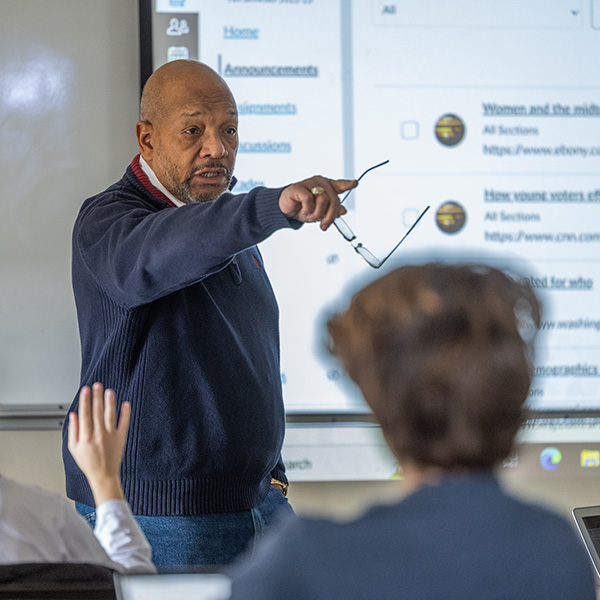
Rodney Coates was born with such a severe form of epilepsy that doctors didn’t expect him to live long. His earliest memory is of crawling on a hospital floor.
Coates eventually outgrew the condition and lived with his family in East St. Louis, Illinois, where 7 out of 10 are unemployed. He said he wasn’t expected to survive those years either.
Or the Vietnam War.
“For me, this whole thing about life has been about survival,” said Coates, professor of Global and Intercultural Studies who is now in his 35th year at Miami University.
The public sociologist put down roots on the Oxford campus after he was lured away from a teaching job at the University of North Carolina at Charlotte. He never expected to stay long at Miami.
“I love the students, the environment, and the challenges I have met here,” he said. “It’s allowed me to thrive, and it’s allowed me to do what I enjoy doing. That’s teaching and doing research, and interestingly enough, service.”
In recent years, Coates has received several top awards, including the President's Medal in 2021, the MAC Outstanding Faculty Award for Student Success in 2022, and a University Faculty Scholar Award last spring.
The MAC award stems from the successful RedHawks Summer Bridge Program, Athletics’ academic boot camp that he developed 15 years ago with Craig Bennett, then-assistant athletic director for academic support services.
“Rodney has been one of the most inspiring collaborators I’ve had the privilege to work with. His passion for students, especially those who might feel like outsiders when they first arrive at Miami, is unmatched,” said Bennett, senior director for student success and retention.
“Rodney has this unique gift of seeing the potential in students before they see it themselves. He combines high expectations with deep care — and that’s why students thrive with him.”
Miami University student-athletes have achieved significant success in the classroom. When fall 2024 semester grades were reported, they combined to post a 3.29 grade-point average — marking their 40th-straight semester with a GPA of 3.0 or higher. The combined GPA was 3.33 this past spring semester.
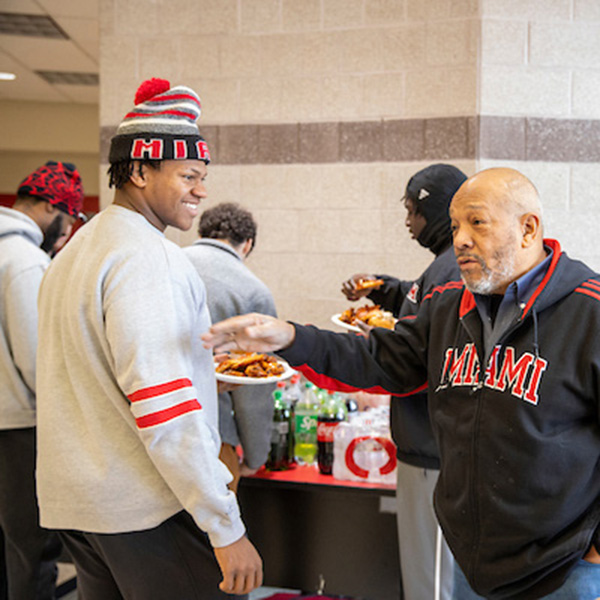
A playbook for success
Coates gives the student-athletes who take his six-week summer bootcamp a playbook of how to succeed in college before their first fall semester.
While most first-year football players aren’t fond of the class requirements that include writing essays and doing nightly readings and other homework, they eventually see the work pay off. Those who don’t achieve a certain average grade by the midterm risk being booted from practices, with the coaches’ full support.
Sometimes, when Coates walks through the workout room later in the fall, he’ll hear, “Dr. Coates, thank you.” In past years, some players have stopped by his office to tell him they made the dean’s list.
Ask Coates what he gets out of it, he has an immediate response.
“Joy,” he said. “This is what I do.”
For him, it’s a way of giving back to his mother and teachers “who refused to allow me to be a failure, who pushed me toward excellence, who had faith in me.”
He does that by paying it forward to the next generation of students.
Bennett said that’s part of what has made the Summer Bridge Program such a success.
“It wasn’t just about academics but about building confidence, community, and belonging. The academic boot camp we created together really came from Rodney’s vision of using culture and community to help student-athletes — and later, a broader group of students — see that they belong in the classroom just as much as on the field. I still hear from students who say it was transformative for them.”
A lasting impact of the program is that it helps students see themselves as leaders and role models beyond their playing careers, Bennett said.
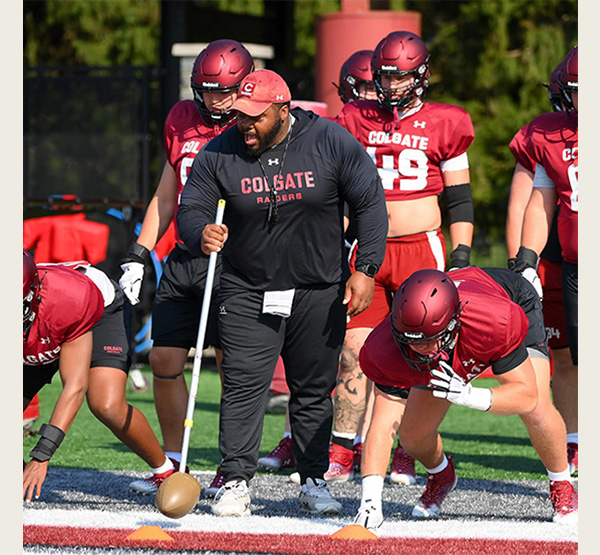
Nate Trawick: from player to coach
Nate Trawick, who played defensive tackle for the RedHawks, graduated from Miami with a bachelor’s in Economics and a minor in Marketing in 2019.
Last year, he became defensive line control coach for Colgate University, a private liberal arts institution in Hamilton, New York.
Trawick said Miami’s academic boot camp prepared him well for Miami’s rigorous academics. He still uses what he learned that summer.
“Dr. Coates does a great job in preparing for the course load you will have at a great institution. The work you do in the summer will make the fall feel like a breeze,” he said. “The program really helped me develop time management and not feel overwhelmed.”
That’s still paying off today.
“In my day to day, I have to balance game planning, recruiting, meetings, and practice. I am able to balance these things because I have a schedule and I have all my tasks mapped out day to day,” Trawick said. “These are things that I picked up in the summer of 2015 doing the academic boot camp.”
Trawick now mentors the student-athletes on his Colgate team.
“I can help give them insight on how to balance their time being a student and athlete. I get a chance to meet with my players to check in with their academics and the direction they want to go in school,” he said, noting that he meets with first-year players twice a week to talk about academic goals, personal goals, and football goals.
“I meet with the freshmen more frequently to make sure I can be a resource to help them adjust to college life,” he said. “The thing that I appreciate the most about the Summer Bridge Program is it sets you on a good path for success. The program develops good habits that will help you over your college career and in the workforce.”
Trawick said he appreciates how Coates wanted him and other student-athletes to succeed in all areas of life.
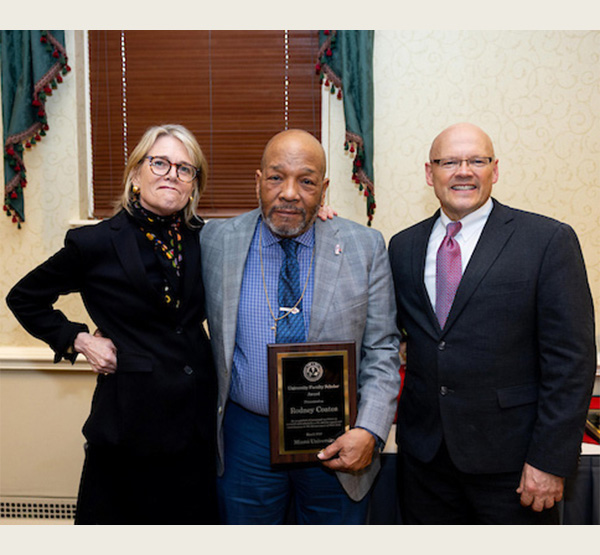
A scholar’s impact through writing
Coates joined Miami in 1990 as an assistant professor in the Department of Gerontology and Sociology. Since 2015, he has been a professor in the Department of Global and Intercultural Studies. He served as director of Black World Studies from 2011 to 2016 and as coordinator of the program since then.
He is frequently featured in the national media, including the New York Times, CBS, and NPR and is Miami’s most prolific contributor to The Conversation.
Coates said he’s a public scholar. “That means my scholarship is intended to inform the public.”
Elizabeth Mullenix, who stepped down from her role of provost this summer to resume teaching in the College of Creative Arts, said she enjoyed working with Coates in the University Senate.
"As a senior faculty member and a prolific scholar, his was an important voice,” Mullenix said. “He walks the walk, evidenced by his enduring work with students in the Cincinnati Public Schools. I really admire that and was so happy to support his work when I was the provost."
Andy Rice, associate professor of Media, Journalism, and Film, described Coates as a “highly respected scholar, and rare mentor, especially for the young, Black men who take inspiration from seeing someone who looks like themselves in a position of leadership and authority on our campus.
“His service to the university is outsized, and he has never been afraid to champion justice, even in the face of controversy.”
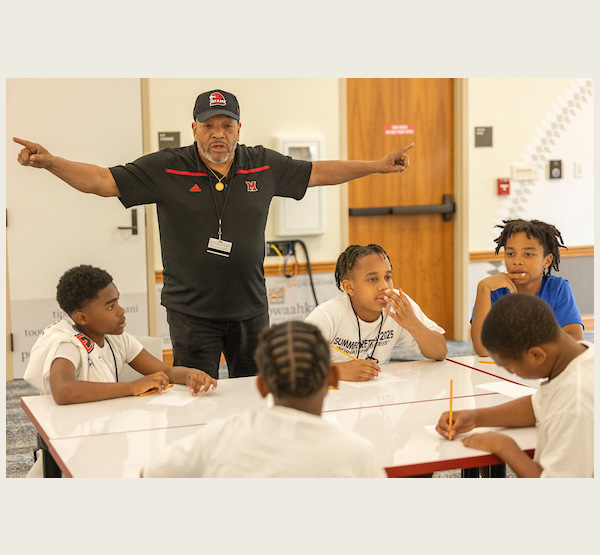
Camp Excel
Rice volunteers for Camp Excel, a four-day residential program that introduces middle school students from Cincinnati Public Schools and Middletown City Schools to what college is like. So far, 400 students have completed the early-summer program over four years.
Coates directs the program that aims to help those students who go on to graduate from high school be ready for college.
“These kids need to discover colleges. We can’t wait for them to discover us. We need to discover them,” he said, calling those middle school years, “the sweet spot.”
Rice said he became involved because “I feel that this is some of the most important service work we can do as faculty in public universities and because I trust Rodney to lead on such an initiative."
Rice, too, wants to help educate the next generation. He believes college is a key pathway for upward mobility for first-generation college students, but he also realizes culture and access can be barriers to entry.
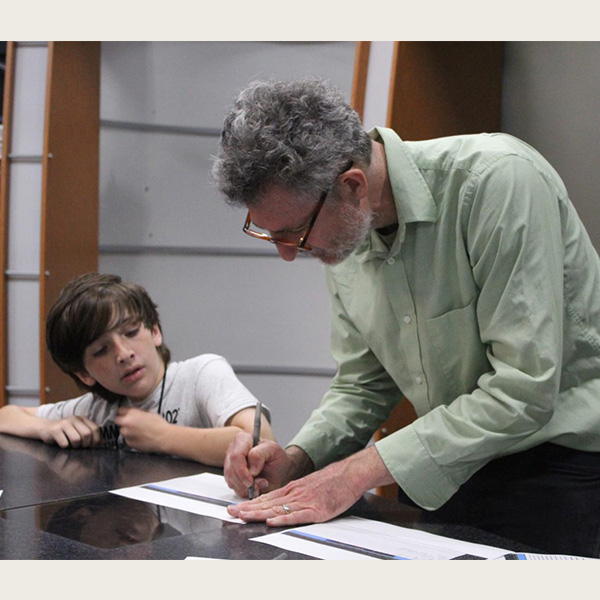
Introducing the possibility of college early
Camp Excel aims to introduce students to the possibility of college early enough that they can set their sights on it through high school. Rice said they learn about resources available to help them, career paths they can pursue, and habits that can accelerate their achievement in high school.
Attending Camp Excel offers the students “a higher likelihood of graduating from college, improving their economic prospects, and becoming lifelong learners,” he added.
Rice said he and colleagues Dan Behnke and Joe Sampson in the Department of Media, Journalism, and Film worked on a set of activities for the middle schoolers, as have dozens of faculty members in other areas across the university.
One year, they introduced students to working in a news studio and had them play different roles (camera, host, sound, switchboard operator, teleprompter, etc.) to do a brief "newscast" about their experience at Camp Excel.
They’ve had them do short podcasts, and in other years, Rice has led students in a sound design workshop where they work together to make the sounds for a 15-second clip from the movie “Coco” and then place them in a timeline in sync with the image.
“The kids really like this one, as they know the footsteps sounds, say, came from their feet just a few minutes ago but really feel like those of the characters in the film,” he said.
Rice wants the students to “imagine a future that they can hold onto” after they leave the camp.
“To know that another life is possible, they first need to see it. They need to meet people who have gone to college, live in a dorm away from home, eat in a dining hall, and hear from faculty members who have spent their lives dedicated to creating new knowledge and inspiring young people to think big,” he said. “Camp Excel can be that first foray into such a world for some of these kids.”
Rice doesn’t get to know the students well in just one session, but every now and then, he sees a spark of engagement. He’s now waiting to meet one of those kids as a student in one of his classes someday. “It will make my day.”
That’s been Coates’ goal all along.
“You get them thinking about college at that point?” Coates said. “That means they’ll take the necessary courses in middle school that allow them to take the courses in high school that allow them to come and be successful.”